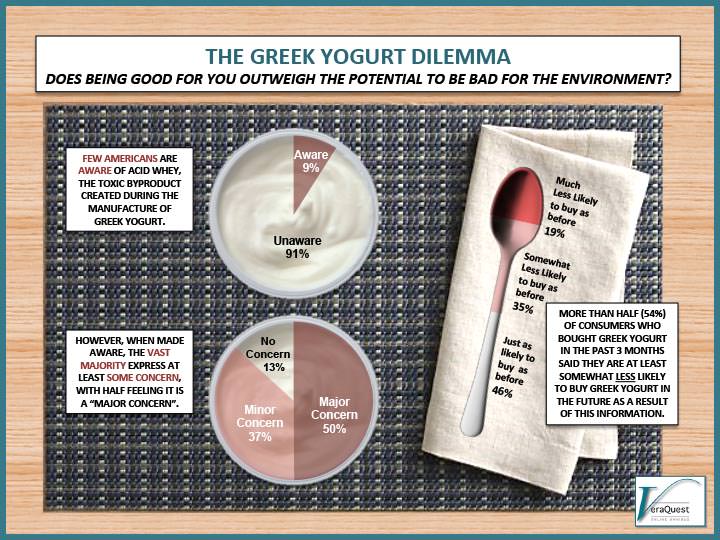First, let me say that I count myself among those who were previously unaware of the potential environmental issue caused by Greek yogurt production. I recently read that when Greek yogurt is manufactured, a large volume of a byproduct called acid whey is created. Acid whey is a thin, runny waste product that cannot simply be “dumped”, as it is toxic to the natural environment – i.e., it would rob rivers and streams of oxygen, killing marine life over large areas.
With the Greek yogurt boom over the past several years, new production plants continue to open all over the country. There are no industry statistics that show how/where companies are disposing of the immense volume of acid whey being created, but many Greek yogurt companies say they pay farmers to take a large percentage of it off their hands. (Farmers can mix acid whey into feed or fertilizer.) In the meantime, companies are racing to find additional disposal solutions to keep up with the production demand.

I’m not alone in my lack of awareness of this seemingly important issue. Based on a recent VeraQuest poll among 1,509 adults, only 9% of Americans say they had heard about the acid whey issue. Once made aware, however, 87% express at least some concern, including 50% of Americans who feel this is a “major concern”.
Some interesting differences in terms of who considers the acid whey issue associated with Greek yogurt to be a “major concern”:
- Women (56%) more than men (43%)
- Younger Americans 18-39 yrs (55%) more than older Americans 40+ (47%)
- Hispanics (65%) more than Black/African-Americans (52%) and Caucasians (46%)
- Those with kids in the household (56%) more than those without kids (46%)
But how will this impact the category, if at all? Will the “concern” translate to consumers shunning their beloved Greek yogurt at store shelves? That remains to be seen. But a sizeable number do express that intention. Just over half (54%) of consumers who bought Greek yogurt within the past 3 months said they are at least somewhat less likely to buy Greek yogurt in the future as a result of this information, including 19% who said they are “much less likely” to buy it.
Greek yogurt buyers in the East (60%) and West (58%) claim to be particularly likely to forego Greek yogurt in the future, while Greek yogurt buyers in the Midwest (46%) show a greater reluctance to reject the product moving forward.
Do you trust that Greek yogurt companies are properly disposing of acid whey? Do you think consumers should stop buying Greek yogurt until there are better acid whey disposal solutions?
Leave a Reply